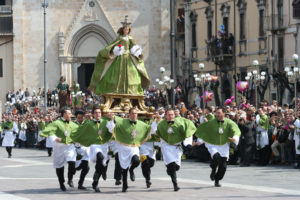I recently joined Twitter and have found that it’s a good way to discover and follow the work of interesting organizations, writers, and artists. Also, I follow an account called Shire Reckoning that tweets events from Lord of the Rings on the days they happened throughout the year. Awesome, right?
But connecting to Twitter has also connected me to endless streams of nasty tweets about the 2012 U.S. presidential campaigns. My feed is filled with 140 character reactions and over-reactions and analyses of why one reaction is warranted but not another and why one candidate’s quip was funny but another’s was actually racist and on and on ad nauseam.
Given the instant, fairly anonymous nature of Twitter, uncharitable rhetoric is probably inevitable. And the barrage of barbs isn’t anything new to presidential elections. During the election of 1800, Thomas Jefferson’s campaign called then-President John Adams “a hideous hermaphroditical character.” Adams’ supporters countered with claims that Jefferson would cause the “teaching of murder, robbery, rape, adultery, and incest.” During the election of 1912, then-President William Howard Taft described Theodore Roosevelt as a “dangerous egotist.” Ol’ Teddy took the high road and called Taft an “infernal skunk in the White House.”
Some of these old insults are rather entertaining. George Weigel has a nice piece on the bygone days of the gentlemanly art of the insult. Shakespeare has shown that insults can be, at times, both appropriate and artistic. But when so much of our general rhetoric is degraded and so many of the insults tossed around are, as Mr. Weigel points out, “invariably scatological or sexual,” I think it’s worth revisiting Dante’s timeless warning about mudslinging.
The setting is the eighth circle of hell, where suffer the falsifiers. (I’ll quote from Mark Musa’s translation of the Inferno, Canto XXX.) Here, Virgil and Dante encounter the shade of Master Adamo, a counterfeiter. Adamo’s soul is so bloated and distorted that he can only move “one inch in every hundred years” on his “useless legs.” Dante notices two other souls floundering in a nearby ditch and asks who they are. Adamo explains that they’ve been in that ditch since he arrived
[. . .] and they haven’t budged since then,
and I doubt they’ll move through all eternity.
One is the false accuser of young Joseph [Potiphar’s wife];
the other is false Sinon, the Greek in Troy [who convinced the Trojans to let in the Trojan horse]:
it’s their burning fever makes them smell so bad.
At this point, Dante recounts, Sinon the Greek
[. . .] perhaps somewhat offended at the kind of introduction he received,
with his fist struck out at the distended belly [of Master Adamo],
which responded like a drum reverberating;
and Master Adam struck him in the face
with an arm as strong as the first he had received.
Adamo taunts Sinon after he hits him, saying that although he can’t move about on his swollen legs, at least his arm is ready for such occasions. Sinon shouts back and the fight really begins:
“But [your hand] was not as free and ready, was it,”
[Sinon] answered, “when you went to the stake?
Of course, when you were coining [counterfeiting] it was readier!”
And he with the dropsy [Adamo]: “Now you tell the truth,
but you were not as full of truth that time
when you were asked to tell the truth at Troy!”
“My words were false—so were the coins you made,”
said Sinon, “and I am here for one false act
but you for more than any fiend in hell!”
“The [Trojan] horse, recall the horse, you falsifier,”
the bloated paunch was quick to answer back,
“may it burn your guts that all the world remembers!”
“May your guts burn with thirst that cracks your tongue,”
the Greek said, “may they burn with rotting humors
that swell your hedge of a paunch to block your eyes!”
And then the money-man: “So there you go,
your evil mouth pours out its filth as usual,
for if I thirst, and humors swell me up,
you burn more, and your head is fit to split,
and it wouldn’t take much coaxing to convince you
to lap the mirror of Narcissus dry!”
Back and forth the damned souls go, getting absolutely nowhere. How many episodes of Hardball does this recall? How many panelists on split screens spewing nonsense? Or, beyond politics: how many Housewives episodes echo this exchange?
But before we sensible ones climb too high on our horses, Dante has words for us viewers, too:
I was listening, all absorbed in this debate,
when the master [Virgil, Dante’s guide] said to me: “Keep right on looking,
a little more, and I shall lose my patience.”
I heard the note of anger in his voice
and turned to him; I was so full of shame
that it still haunts my memory today.
Virgil gets angry at Dante for becoming absorbed in the fight. Dante realizes his mistake and asks Virgil’s forgiveness. Seeing he is sorry, Virgil quickly forgives Dante, but warns him:
If ever again you should meet up with men
engaging in this kind of futile wrangling,
remember I am always at your side;
to have a taste for talk like this is vulgar!
Virgil is angry and Dante is ashamed because this “futile wrangling” not only hurts the participants, but it degrades the viewer. There’s no such thing as an innocent bystander to this type of talk. Souls are precious and impressionable things, and that’s why St. Paul tells the Philippians: “Whatever is true, whatever is noble, whatever is right, whatever is pure, whatever is lovely, whatever is admirable—if anything is excellent or praiseworthy—think about such things.”
So don’t tune out of all debates and discussions this election season—get informed and vote!—but keep St. Paul’s exhortation in mind and watch out, like Dante, for the “futile wrangling.”






1 thought on “Dante Dishes on the 2012 Elections”
Haha! This is great.